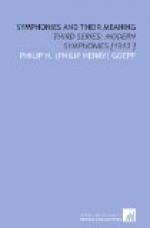The magic midnight strokes sound clear and sharp. In eager chords of tuned pitch the fiddling ghost summons the dancing groups, where the single fife is soon followed by demon violins.
Broadly sings now the descending tune half-way between a wail and a laugh. And ever in interlude is the skipping, mincing step,—here of reeds answered by solo violin with a light clank of cymbals. Answering the summoning fifes, the unison troop of fiddlers dance the main step to bright strokes of triangle, then the main ghostly violin trips in with choir of wind. And broadly again sweeps the song between tears and
[Music: In waltz rhythm (Flute) (Harp, with sustained bass note of strings)]
smiles. Or Death fiddles the first strain of reel for the tumultuous answer of chorus.
Now they build a busy, bustling fugue (of the descending song) and at the serious moment suddenly
[Music: (Solo violin) Largamente (Pizz. strings)]
they skip away in new frolicsome, all but joyous, tune: a shadowy counterfeit of gladness, where the sob hangs on the edge of the smile. As if it could no longer be contained, now pours the full passionate grief of the broad descending strain. Death fiddles his mournful chant to echoing, expressive wind. On the abandon of grief follows the revel of grim humor in pranks of mocking demons. All the strains are mingled in the ghostly bacchanale. The descending song is answered in opposite melody. A chorus of laughter follows the tripping dance. The summoning chords, acclaimed by chorus, grow to appealing song in a brief lull. At the height, to the united skipping dance of overpowering chorus the brass blows the full verse of descending song. The rest is a mad storm of carousing till ... out of the whirling darkness sudden starts the sharp, sheer call of prosaic day, in high, shrill reed. On a minishing sound of rolling drum and trembling strings, sings a brief line of wistful rhapsody of the departing spirit before the last whisking steps.
PHAETON
On a separate page between title and score is a “Notice,”—an epitome of the story of Phaeton, as follows:
“Phaeton has been permitted to drive the chariot of the Sun, his father, through the heavens. But his unskilful hands frighten the steeds. The flaming chariot, thrown out of its course, approaches the terrestrial regions. The whole universe is on the verge of ruin when Jupiter strikes the imprudent Phaeton with his thunderbolt.”
There is a solemn sense at first (Maestoso), a mid-air poise of the harmony, a quick spring of resolution and—on through the heavens. At the outset and always is the pervading musical charm. In the beginning is the enchantment of mere motion in lightest prancing strings and harp with slowly ascending curve. In farther journey comes a spring of the higher wood and soon a firm note of horns and a blast of trumpets on a chirruping call, till the whole panoply of solar brilliance is shimmering. Now with the continuing pulse (of saltant strings) rings a buoyant,




